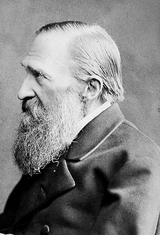
Born: July 28, 1812, Warsaw , Russian partition of Poland (presently Warsaw, Poland)
Born: March 19, 1887, Geneve, Switzerland
Early days. He was born as the youngest of five siblings to a nobleman's family (Coat of Arms Jastrzebiec) of landlords: father Jan, sergeant major of Pruzanski county, mother Zofia nee Malska. His parents lived the estate Dolhe in what is today Belarus. In his early days he was cared for by his grandmother Zofia Malska and by his great-grandmother Konstancja Nowomiejska. He obtained his elementary education in Biala Podlaska Academy (1822-1826) and in a Lublin school (1826-1827). Then he attended a highschool (Gimnazjum) in Swislocz (1827-1829) and passed final exam (matura). In 1829 he started medical studies at the Wilno University which he soon abandoned in favor of literature. He participated in underground student organizations, got arrested at the end of 1830 and released a year later thanks to the connections of his aunt. He had to settle in Wilno and be subject to police surveillance to the end of 1832. This experience caused his negative attitude toward uprisings. During this time he wrote a four volume history of Wilno Wilno od poczatkow jego do roku 1750 (1840-1842) and few novels. Soon thereafter he moved to his family estate, Dolhe. In 1838 he married Zofia Woronicz. They moved to Volhynia and in 1840 they bought the village Grodek. In the years 1841-51 he edited in Volhynia, and published in Wilno the bimonthly "Athenaeum." The Kraszewskis had four children: Konstancja; Jan, Franciszek, and Augusta. His agricultural endeavors were not successful and in 1848 he sold Grodek and moved to Zytomierz where they lived till 1860; he worked there in school administration and was active among Polish gentry. He was against the feudal system and, after a six months trip to Western Europe in 1858, he became partisan of West European democratic and economic. As a result of his dispute with conservative public opinion on his critical assessment of the gentryďż˝s attitude towards peasants, in 1859 he accepted the proposal of L. Kronenberg, a banker of Jewish origin from Warsaw, to become the editor of the "Gazeta Warszawska" (from 1961 "Gazeta Polska") and he moved with his family to Warsaw. Owing to his editorial skills, the number of "Gazeta" subscribers within half a year rose from 500 to 8000, but at the same time he had to stand the vicious remarks of anti-Semites. In 1863 he was forced, as a opponent of margrave Wielopolski who was submissive to Petersburg, to move to Dresden where he lived till 1884 and published, under the pseudo Bogdan Boleslawita, several novels about insurrection (Dziecię Starego Miasta 1863, Moskal 1865, Zyd 1866 and others). After unsuccessful attempts to settle in Lwow and then in Cracow, he started his own printing house in Dresden in 1868 which he sold in 1871. At the same time he became a Saxon citizen. In 1882 he founded "Macierz Polska" in Lwow. A year later he was arrested accused of spying for France and sentenced to 3 ďż˝ years in the Magdeburg fortress. Released on bail in 1885 because of lung cancer he went Italy and in 1886 to Geneve, Switzerland where he died of pneumonia. He was buried in the meritorious vault of the Na Skalce cemetery in Cracow.